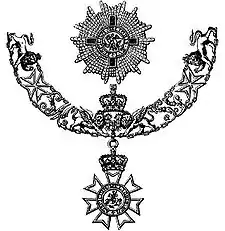Prince Edward, Duke of Kent
Prince Edward, Duke of Kent, KG, GCMG, GCVO, CD, ADC (Edward George Nicholas Paul Patrick; born 9 October 1935) is a member of the British royal family. He is a first cousin of Queen Elizabeth II through their fathers, Prince George, Duke of Kent, and King George VI. Because his mother, Princess Marina of Greece and Denmark was a first cousin of Prince Philip, Duke of Edinburgh, Edward is both a first cousin once removed and second cousin to the Prince of Wales and his siblings.
| Prince Edward | |||||
|---|---|---|---|---|---|
| Duke of Kent (more) | |||||
.jpg.webp) The Duke of Kent in 2014 | |||||
| Born | 9 October 1935 3 Belgrave Square, London, England | ||||
| Spouse | |||||
| Issue | |||||
| |||||
| House | Windsor | ||||
| Father | Prince George, Duke of Kent | ||||
| Mother | Princess Marina of Greece and Denmark | ||||
| Military career | |||||
| Service/ | British Army | ||||
| Years of service | 1955–1976 (end of active service) | ||||
| Rank | Field Marshal | ||||
| Service number | 443787 | ||||
| Unit | Royal Scots Greys | ||||
| Royal family of the United Kingdom and the other Commonwealth realms |
|---|
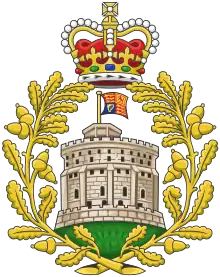 |
|
He has held the title of Duke of Kent since the age of six, after the death of his father in a plane crash in 1942. Edward carries out engagements on behalf of the Queen and is involved with over 140 charitable organisations. He is president of the All England Lawn Tennis and Croquet Club, presenting the trophies to the Wimbledon champion and runner-up, and served as the United Kingdom's Special Representative for International Trade and Investment, retiring in 2001. He is president of The Scout Association, the Royal United Services Institute, and the Royal Institution of Great Britain, and since 1967 Grand Master of the United Grand Lodge of England. Much of his charity work revolves around war remembrance, technology, and the growth of British industry.
Early life and education
Prince Edward was born on 9 October 1935, at No. 3 Belgrave Square, London, to the Duke and Duchess of Kent.[1] Home Secretary Sir John Simon was present to verify the birth. His father was the fourth son of King George V and Queen Mary. His mother was the daughter of Prince Nicholas of Greece and Denmark and Grand Duchess Elena Vladimirovna of Russia. He was baptised in the Private Chapel of Buckingham Palace on 20 November 1935 by the Archbishop of Canterbury Cosmo Lang. His godparents were his grandparents, King George V, Queen Mary and Prince Nicholas of Greece and Denmark; as well as the Prince of Wales; the Princess Royal, the Duke of Connaught and Strathearn (whose son, Prince Arthur of Connaught, stood proxy); and the Duchess of Argyll.[2]
Prince Edward began his education at Ludgrove, a preparatory school in Berkshire, before going on to Eton College[3] and then Le Rosey in Switzerland.[4] After school he entered the Royal Military Academy Sandhurst,[5] where he won the Sir James Moncrieff Grierson prize for foreign languages. Edward speaks fluent French, having been raised in a house where, according to the words of his younger brother, Prince Michael of Kent, his mother and aunts spoke French as a matter of preference.[6]
On 25 August 1942, Prince Edward's father, the Duke of Kent, was killed when his plane crashed in bad weather in Caithness. Prince Edward, at six years old, succeeded his father as Duke of Kent,[7] Earl of St Andrews and Baron Downpatrick. As a member of the royal family, Prince Edward began performing engagements at an early age. In 1952, at the age of 16, he walked behind the coffin of his uncle, George VI, at his state funeral.[8] In 1953, he attended the coronation of his cousin, Elizabeth II, and was the third to pay homage at her throne, following the Dukes of Edinburgh and Gloucester.[9]
Military service
On 29 July 1955, the Duke of Kent graduated from the Royal Military Academy Sandhurst as a Second Lieutenant in the Royal Scots Greys,[10] the beginning of a military career which lasted over 20 years. He was promoted to captain on 29 July 1961.[11]
From 1962 to 1963, the Duke of Kent served in Hong Kong, later serving on the staff in Eastern Command. He was promoted to Major on 31 December 1967.[12] In 1970, the Duke commanded a squadron of his regiment serving in the British Sovereign Base Area in Cyprus, part of the UN force enforcing peace between the Greek and Turkish parts of the divided island. During the early 1970s, the Duke also served in Northern Ireland with his Regiment. He was promoted to Lieutenant-Colonel on 30 June 1973.[13]
The Duke retired from the Army on 15 April 1976.[14] He was subsequently promoted to Major-General on 11 June 1983[15] and to Field Marshal on 11 June 1993.[16]
Marriage and personal life
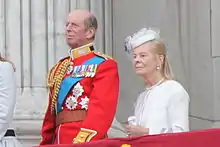
The Duke of Kent married Katharine Worsley at York Minster on 8 June 1961. Katharine is the only daughter of Sir William Arthrington Worsley, 4th Bt., and his wife, Joyce Morgan Brunner. They have three living children:
- George, Earl of St Andrews, born 26 June 1962 at Coppins; married Sylvana Tomaselli
- Lady Helen Taylor, born 28 April 1964 at Coppins; married Timothy Taylor
- Lord Nicholas Windsor, born 25 July 1970 at King's College Hospital in London; married, 2006, Paola Doimi de Lupis de Frankopan
- Lord Patrick Windsor, stillborn 5 October 1977[17]
Katharine had an abortion in 1975 due to German measles.[18] She converted to Catholicism in 1994.[19] Because this conversion occurred after their marriage, it did not cause the Duke to lose his place in the line of succession, as the Act of Settlement 1701 only applied where the spouse was a Catholic at the time of marriage. The disqualification by marrying a Catholic was removed by the Succession to the Crown Act 2013.
The Duke and Duchess of Kent reside at Wren House, Kensington Palace, in London.[20]
The Duke had a mild stroke on the morning of 18 March 2013.[19] In April 2015, he suffered from a hip injury and was hospitalised at Aberdeen Royal Infirmary for further treatments.[21]
Activities
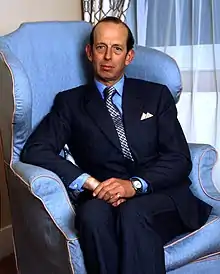
The Duke of Kent has performed engagements on behalf of his cousin, the Queen, for over 50 years. The Duke has represented the Queen during independence celebrations in the Commonwealth countries of Sierra Leone,[22] Uganda,[23] Guyana,[24] Gambia[25] Ghana, to commemorate its 50th independence anniversary celebration.[26] He has also acted as Counsellor of State during periods of the Queen's absence abroad.[27]
One of the Duke's major public roles for many years was Vice-Chairman of British Trade International, formerly known as the British Overseas Trade Board, and later as the United Kingdom's Special Representative for International Trade and Investment. This position saw the Duke travel abroad to represent the British government in fostering trade relations with foreign countries and organisations. Prince Andrew, Duke of York succeeded him in this position, which is today known as UK Trade & Investment (or UKTI), although Prince Andrew resigned from the post in 2011.[28] He was also the vice chairman of the British Overseas Trade Board.[29] In that capacity, he became the first member of the royal family to visit China in 1979 with his focus being on the British Energy Exhibition in Beijing.[30]
From 1971 to 2000, the Duke of Kent was president of English football's governing body, The Football Association. The Duke has served as the President of The Scout Association since 1975.[31] Along with Prince William of Wales, the Duke visited the Centenary World Scout Jamboree at Hylands Park, Chelmsford in July 2007.[32] He also serves as the president of the All England Lawn Tennis and Croquet Club,[33] a position in which he succeeded his late mother, Princess Marina, Duchess of Kent.[34] His other roles include President of the Commonwealth War Graves Commission,[35] the RAF Benevolent Fund,[36][37] the Royal National Lifeboat Institution,[38][39] the Stroke Association,[33][40] the Royal United Services Institute,[41] the Royal Institution,[42] the British Racing Drivers' Club,[43] and patron of The American Air Museum In Britain,[44] Royal West Norfolk Golf Club,[45] Kent County Cricket Club,[46] Opera North,[47] Trinity Laban Conservatoire of Music and Dance,[48] and St Mungo's Broadway, benefiting the homeless. He is also on the advisory panel for the Mountbatten Medal and presents the medal once the decision has been made. The Duke of Kent is one of the Royal Fellows of the Royal Academy of Engineering.[49]
For almost 29 years, the Duke has been the patron of Endeavour, a national youth organisation.[50] He has also served as Royal Patron of The Honourable Society of Lincoln's Inn since 2001, a position previously occupied by his father.[51] In 2015, the Duke received the Dresden Peace Prize for "his contribution to British-German reconciliation."[52]
Freemasonry
The Duke was initiated into Royal Alpha Lodge No. 16 on 16 December 1963, and was elected its Worshipful Master for 1965 and 1966.[53]
Having been appointed Senior Grand Warden in 1966, he was elected as Grand Master the following year, and was installed on 14 June 1967 during United Grand Lodge of England's 250th anniversary celebrations at the Royal Albert Hall.[54] He is the 10th, and longest-serving Grand Master of UGLE, the governing body of Freemasonry in England and Wales.
In December 2013, he celebrated 50 years as a freemason.[53] In October 2017 he presided over the tercentenary celebrations of UGLE, marking the 300th anniversary of the founding of the original Grand Lodge, one of two which merged to form UGLE in 1813.[55] The main ceremony was held in the Royal Albert Hall, in the year which also marked the Duke's 50th anniversary of installation as Grand Master.
Titles, styles, honours and arms
Titles and styles
- 9 October 1935 – 25 August 1942: His Royal Highness Prince Edward of Kent
- 25 August 1942 – present: His Royal Highness The Duke of Kent
Military ranks
- 29 July 1955: Second Lieutenant, Royal Scots Greys[56]
- 29 July 1957: Lieutenant, Royal Scots Greys[57]
- 29 July 1961: Captain, Royal Scots Greys[58]
- 31 December 1967: Major, Royal Scots Greys[59]
- 30 June 1973: Lieutenant-Colonel, Royal Scots Dragoon Guards.[60] Retired on 15 April 1976[61]
- 11 June 1983: Major General[15]
- 11 June 1993: Field Marshal[62]
Honours
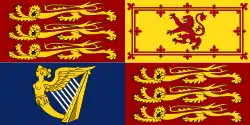 1960: Knight Grand Cross of the Royal Victorian Order (GCVO)
1960: Knight Grand Cross of the Royal Victorian Order (GCVO) Knight Grand Cross of the Order of St Michael and St George (GCMG)
Knight Grand Cross of the Order of St Michael and St George (GCMG)
 1985: Royal Knight of the Order of the Garter (KG)
1985: Royal Knight of the Order of the Garter (KG) 12 May 1937: King George VI Coronation Medal
12 May 1937: King George VI Coronation Medal 2 June 1953: Queen Elizabeth II Coronation Medal
2 June 1953: Queen Elizabeth II Coronation Medal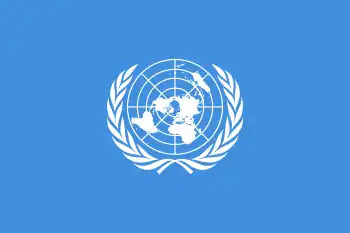 1970: United Nations Medal for the UNFICYP mission
1970: United Nations Medal for the UNFICYP mission 6 February 1977: Queen Elizabeth II Silver Jubilee Medal
6 February 1977: Queen Elizabeth II Silver Jubilee Medal 6 February 2002: Queen Elizabeth II Golden Jubilee Medal
6 February 2002: Queen Elizabeth II Golden Jubilee Medal 6 February 2012: Queen Elizabeth II Diamond Jubilee Medal
6 February 2012: Queen Elizabeth II Diamond Jubilee Medal Army Long Service and Good Conduct Medal with 3 Bars
Army Long Service and Good Conduct Medal with 3 Bars
Commonwealth
 1961: Sierra Leone Independence Medal
1961: Sierra Leone Independence Medal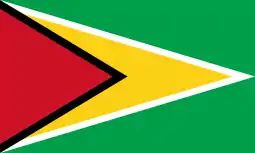 1966: Guyana Independence Medal
1966: Guyana Independence Medal.svg.png.webp) Canadian Forces' Decoration (with two clasps) (CD)
Canadian Forces' Decoration (with two clasps) (CD)
Foreign
 6 November 2000: Knight of the Order of Charles XIII[63]
6 November 2000: Knight of the Order of Charles XIII[63] Order of Saints George and Constantine First class (civil division)
Order of Saints George and Constantine First class (civil division)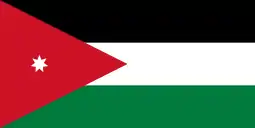 Grand Cordon of the Supreme Order of the Renaissance (special class)
Grand Cordon of the Supreme Order of the Renaissance (special class) Grand Cordon of the Order of the Star of Jordan
Grand Cordon of the Order of the Star of Jordan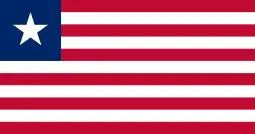 Grand Cross of the Order of the Star of Africa
Grand Cross of the Order of the Star of Africa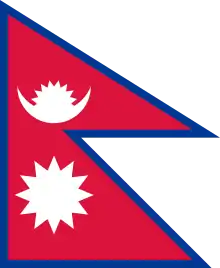 Order of the Three Divine Powers First Class (Jyotirmaya-Subikhyat-Tri-Shakti-Patta)
Order of the Three Divine Powers First Class (Jyotirmaya-Subikhyat-Tri-Shakti-Patta) Grand Cross of the Order of St Olav
Grand Cross of the Order of St Olav Grand Cross of the Order of Merit of the Republic of Poland
Grand Cross of the Order of Merit of the Republic of Poland 21 May 2015: Order of Merit of the Free State of Saxony[64]
21 May 2015: Order of Merit of the Free State of Saxony[64] 1991: Golden Pheasant Award of the Scout Association of Japan[65]
1991: Golden Pheasant Award of the Scout Association of Japan[65]
Civilian appointments
 Personal Aide-de-Camp to the Queen (1966 to date)
Personal Aide-de-Camp to the Queen (1966 to date) University of Surrey, Chancellor (January 1977 to date)
University of Surrey, Chancellor (January 1977 to date)
Military appointments
 Colonel-in-Chief, of The Lorne Scots (Peel, Dufferin and Halton Regiment)[66] (11 June 1977 – present)
Colonel-in-Chief, of The Lorne Scots (Peel, Dufferin and Halton Regiment)[66] (11 June 1977 – present)
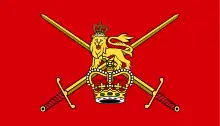 Colonel, of the Scots Guards
Colonel, of the Scots Guards Colonel-in-Chief, of the Royal Regiment of Fusiliers
Colonel-in-Chief, of the Royal Regiment of Fusiliers Colonel, 1st Battalion, of The Rifles
Colonel, 1st Battalion, of The Rifles Deputy Colonel-in-Chief, of the Royal Scots Dragoon Guards[67]
Deputy Colonel-in-Chief, of the Royal Scots Dragoon Guards[67]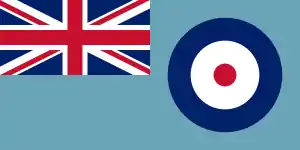 1993: Honorary Air Commodore, of the RAF Leuchars[68]
1993: Honorary Air Commodore, of the RAF Leuchars[68] 15 June 1985 – 30 June 1996: Honorary Air Vice Marshal RAF[69]
15 June 1985 – 30 June 1996: Honorary Air Vice Marshal RAF[69] 1 July 1996: Honorary Air Chief Marshal RAF[70]
1 July 1996: Honorary Air Chief Marshal RAF[70]
Arms
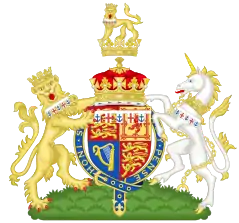 |
|
Issue
| Name | Birth | Death | Marriage | Children | |
|---|---|---|---|---|---|
| George Windsor, Earl of St Andrews | 26 June 1962 | 9 January 1988 | Sylvana Tomaselli | Edward Windsor, Lord Downpatrick Lady Marina Windsor Lady Amelia Windsor | |
| Lady Helen Taylor | 28 April 1964 | 18 July 1992 | Timothy Taylor | Columbus Taylor Cassius Taylor Eloise Taylor Estella Taylor | |
| Lord Nicholas Windsor | 25 July 1970 | 4 November 2006 | Paola Doimi de Lupis de Frankopan | Albert Windsor Leopold Windsor Louis Windsor | |
| Lord Patrick Windsor (stillborn) | 5 October 1977 | ||||
Ancestry
| Ancestors of Prince Edward, Duke of Kent |
|---|
Notes
- As a British prince, a surname is not usually used but when one is, Windsor is used.
References
- "No. 34206". The London Gazette. 9 October 1935. p. 6371.
- "Prince Edward Christened – Ceremony at the Palace". The Times. The Times Digital Archive. 21 November 1935. p. 14.
- "Royals". Eton College. Retrieved 25 March 2018.
- "Grand Master - HRH The Duke of Week". United Grand Lodge of England. Retrieved 25 March 2018.
- "Prince Edward: Military Career". Official website of the British Monarchy. Archived from the original on 2 April 2015. Retrieved 11 March 2015.
- Seward, Ingrid (1994). Royal Children. London: St. Martin's Press. ISBN 978-0312105334.
- "Duke of Kent, 77, suffers mini-stroke". Herald Scotland. 21 March 2013. Retrieved 21 March 2013.
- Cavendish, Richard (2 February 2002). "The Funeral of King George VI". History Today. Retrieved 25 March 2018.
- "Queen Elizabeth II Coronation - Part 2 - the Lords Pay Homage". YouTube. AntPDC. 21 September 2011. Retrieved 25 March 2018.
- "No. 41137". The London Gazette (Supplement). 30 July 1957. p. 4492.
- "No. 42422". The London Gazette (Supplement). 28 July 1961. p. 5561.
- "No. 44493". The London Gazette (Supplement). 2 January 1968. p. 75.
- "No. 46046". The London Gazette (Supplement). 7 August 1973. p. 9389.
- "No. 46877". The London Gazette (Supplement). 20 April 1976. p. 5659.
- "No. 49392". The London Gazette (Supplement). 21 June 1983. p. 8191.
- "No. 53342". The London Gazette (Supplement). 21 June 1993. p. 10183.
- "I lost my baby at nine months .. it devastated me; The Duchess of Kent reveals the stillbirth that led to a breakdown". The Mirror. 23 December 1997. Retrieved 26 March 2016.
- "I lost my baby at nine months .. it devastated me; The Duchess of Kent reveals the stillbirth that led to a breakdown. - Free Online Library". www.thefreelibrary.com. Retrieved 3 April 2020.
- Rayner, Gordon (21 March 2013). "Duke of Kent being treated in hospital after 'mild' stroke". The Telegraph. Retrieved 21 March 2013.
- "Royal residences: Kensington Palace". Official website of the British Monarchy. Archived from the original on 26 July 2013.
- "Duke of Kent leaves hospital after hip injury treatment". BBC. 7 April 2015. Retrieved 23 March 2018.
- "Sierra Leone Independence Build-Up". British Pathe. 1 May 1961. Retrieved 25 March 2018.
- Mwesigye, Shifa (9 October 2012). "50 years on, Duke of Kent returns to familiar Uganda". The Observer. Retrieved 25 March 2018.
- "Prince Harry impressed with Guyana's commitment to conservation, sustainable development". Georgetown, Guyana: Ministry of the Presidency. 2 December 2016. Retrieved 25 March 2018.
President David Granger showing Prince Henry of Wales an image of his cousin Prince Edward, Duke of Kent who presented the instrument of Guyana's Independence to former Head of State, President Forbes Burnham.
- "Gambia Independent". British Pathe. 25 February 1965. Retrieved 25 March 2018.
- "Duke of Kent unveils plaque for military project". Ghana Armed Forces. Ghana Web. 7 March 2007. Retrieved 25 March 2018.
- "The Duke of Kent - Supporting the Queen". Official website of the Royal Family. Retrieved 25 March 2018.
- Raynor, Gordon (22 July 2011). "Duke of York drops trade role after years of criticism". The Telegraph (UK). Retrieved 22 November 2017.
- Lefkovits, Etgar (4 September 2007). "Prince Edward to arrive today; 1st royal visit in decade". Jerusalem Post. Retrieved 25 April 2018.
- Brewer, James (26 October 2015). "A Royal pioneer in promoting trade with modern China…". All About Shipping. Retrieved 25 May 2018.
- "Royal Support for the Scouting and Guiding Movements". Official Website of the British Monarchy. Archived from the original on 24 January 2009. Retrieved 25 July 2008.
- Adams, Stephen (28 July 2007). "A century on, Scouts' campfires burn strong". The Telegraph. Retrieved 10 November 2015.
- Rayner, Gordon (22 March 2013). "Duke of Kent spends another day in hospital after 'mild' stroke". The Telegraph. Retrieved 25 March 2018.
The Duke is perhaps best known for his role as president of the All England Lawn Tennis and Croquet Club, presenting trophies to the winners at Wimbledon.
- "Princess Marina Dies (1968)". British Pathé. YouTube. 13 April 2014. Retrieved 25 March 2018.
- "Duke of Kent makes history as first royal to lay wreath at 1916 memorial". TheJournal.ie. 1 May 2013. Retrieved 25 March 2018.
- "Principals". RAF Benevolent Fund. Retrieved 25 March 2018.
- "Royal visit". RAF Benevolent Fund. 18 January 2013. Retrieved 25 March 2018.
- "Our Patron and President". Royal National Lifeboat Institution. Retrieved 25 March 2018.
- McCallen, Laura (31 May 2017). "Duke of Kent visits Royal National Lifeboat Institution stations". Royal Central. Retrieved 25 March 2018.
- "HRH The Duke of Kent: A Life Of Service". Stroke Association. Retrieved 25 March 2018.
- "RUSI celebrates the Diamond Jubilee". Royal United Services Institute. 30 May 2012. Retrieved 25 March 2018.
- "His Royal Highness the Duke of Kent (1935-)". Royal Institution. Retrieved 25 March 2018.
- "Who We Are". The British Racing Drivers' Club. Retrieved 25 May 2018.
- http://www.AmericanAirMuseum.com
- "About the course". Royal West Norfolk Golf Club. Retrieved 25 May 2018.
- "Jamie Clifford appointed Honorary Life Member". Kent County Cricket Club. 2 February 2018. Retrieved 25 May 2018.
- "Who's who at Opera North". Retrieved 25 May 2018.
- "HRH The Duke of Kent KG". Trinity Laban. Retrieved 25 May 2018.
- "The Fellowship". Royal Academy of Engineering. Retrieved 25 May 2018.
- "Court Circular". Official website of the Royal Family. 16 September 2015. Retrieved 25 March 2018.
The Duke of Kent, Patron, Endeavour Training, this morning received Mr. Steven Turner upon assuming his appointment as Chief Executive Officer.
- "Our Membership". The Honourable Society of Lincoln's Inn. Retrieved 25 March 2018.
- "HRH The Duke of Kent receives Dresden Peace Prize". Gov.uk. 14 February 2015. Retrieved 25 May 2018.
- "Grand Master celebrates 50 years in the Craft at Royal Alpha Lodge". Freemasonry Today. Grand Lodge Publications. Retrieved 21 April 2014.
- "History of Freemasonry". United Grand Lodge of England. Retrieved 21 May 2018.
- "Royal Albert Hall plays host to UGLE's epic Tercentenary celebrations". Freemasonry Today. 2 November 2017. Retrieved 30 April 2019.
- "No. 40593". The London Gazette (Supplement). 27 September 1955. p. 5427.
- "No. 41137". The London Gazette (Supplement). 30 July 1957. p. 4492.
- "No. 42422". The London Gazette (Supplement). 28 July 1961. p. 5561.
- "No. 44493". The London Gazette (Supplement). 2 January 1968. p. 75.
- "No. 46046". The London Gazette (Supplement). 7 August 1973. p. 9389.
- "No. 46877". The London Gazette (Supplement). 20 April 1976. p. 5659.
- "No. 53342". The London Gazette (Supplement). 15 June 1993. p. 10183.
- "Svenska Frimurare Orden". Archive. 25 June 2001. Archived from the original on 25 June 2001. Retrieved 21 March 2013.
- Duke of Kent awarded Saxonian Order of Merit
- "䝪䞊䜲䝇䜹䜴䝖日本連盟 きじ章受章者" (PDF) (in Japanese). Retrieved 25 March 2018.
- "No. 47235". The London Gazette (Supplement). 11 June 1977. p. 7119.
- "No. 53555". The London Gazette (Supplement). 25 January 1994. p. 1087.
- "No. 53267". The London Gazette (Supplement). 6 April 1993. p. 6179.
- "No. 50204". The London Gazette (Supplement). 23 July 1985. p. 10113.
- "No. 54453". The London Gazette. 1 July 1996. p. 8917.
External links
 Media related to Prince Edward, Duke of Kent at Wikimedia Commons
Media related to Prince Edward, Duke of Kent at Wikimedia Commons- Hansard 1803–2005: contributions in Parliament by the Duke of Kent
- The Duke of Kent at the Royal Family website
- The United Grand Lodge of England – HRH The Duke of Kent, KG, GCMG, GCVO, ADC (Grand Master)
- Time Article on Birth of Prince Edward
Prince Edward, Duke of Kent Born: 9 October 1935 | ||
| Lines of succession | ||
|---|---|---|
| Preceded by Rufus Gilman |
Succession to the British throne son of George, son of George V |
Followed by Earl of St Andrews |
| Peerage of the United Kingdom | ||
| Preceded by The Prince George |
Duke of Kent 2nd creation 25 August 1942 – present |
Incumbent Heir-apparent: George Windsor, Earl of St Andrews |
| Orders of precedence in the United Kingdom | ||
| Preceded by The Duke of Gloucester |
Gentlemen The Duke of Kent |
Succeeded by Prince Michael of Kent |
| Masonic offices | ||
| Preceded by The Earl of Scarbrough |
Grand Master of the United Grand Lodge of England 1967–present |
Incumbent |
| Honorary titles | ||
| Preceded by The Earl Alexander of Tunis |
Grand Master of the Order of St Michael and St George 1967–present |
Incumbent |
| Sporting positions | ||
| Preceded by Princess Marina, Duchess of Kent |
President of the All England Lawn Tennis and Croquet Club 1969–present |
Incumbent |
| Preceded by The Earl of Harewood |
President of The Football Association 1971–2000 |
Succeeded by The Duke of York |
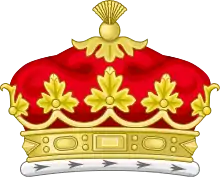
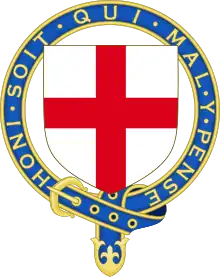
%252C_University_of_Surrey.jpg.webp)
